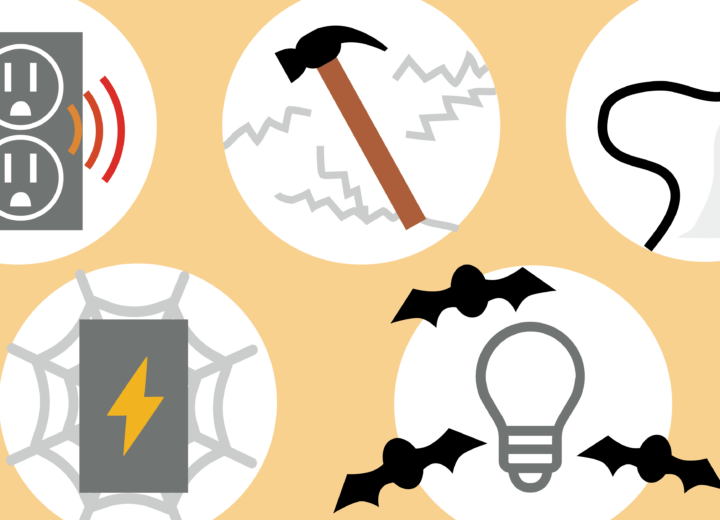This week is National Fire Prevention Week, a time dedicated to raising awareness to dangers that could be haunting your home. With electrical hazards being a leading cause of house fires, it’s important to practice scary-good safety to protect yourself and your loved ones. Learn more below about what you can do to ward off these electric evils:

![]()
Improperly installed or damaged wiring can pose a significant fire risk. Keep an eye out for these warning signs in your home, which could be early indicators of wiring concerns:
- Flickering or dimming lights.
- Outlets that are hot.
- Burning plastic smell.

![]()
By leaving your electricity to the professionals, you can rest assured you are reducing the risk of fires caused by DIY fixes. You should never:
- Attempt to splice or reattach wires on your own.
- Consider any remodels that involve hammering or drilling into walls without first consulting an electrician.
- Try to install your own in-wall wiring for applications such as lighting.

![]()
Consider doing a “cord check” of your home to assess for potential hazards. It’s also important to:
- Never run cords under carpeting, bedding or other flammable materials and make sure no cords are pinched and pressed under another surface (under a chair, leg of the couch, etc).
- Discard broken or damaged cords and never splice two cords together.
- Never overload your outlets.

![]()
If your home has a fuse box, be sure to practice the following:
- To prevent electric shock, turn off all appliances on the circuit before changing a fuse.
- Make sure your hands are dry when changing a fuse, and never change a fuse while standing on a wet surface (puddle, in the rain, etc).
- Always screw fuses in as tight as you can.

![]()
Changing a lightbulb incorrectly is more of an electrical danger than you might think. Stay safe and keep the following mind:
- Before changing a bulb, turn off the main power source—just turning off the light switch doesn’t mean electricity isn’t still flowing to the bulb.
- Removing a bulb should be easy. If it’s not, use a thick glove to grip and unscrew, being extra careful not to apply too much pressure and shatter the glass.
- Check your fixture’s power rating to ensure you are using the correct wattage of bulb.
To learn more about what you can do to scare away safety hazards in your home, visit AEPOhio.com/Safety.



These tips are very helpful. Everyone should follow these safety tips.
Using dielectric grease (light bulb grease) on the base of the light bulbs makes it much easier to unscrew them down the road. I usually pick it up at an auto parts store. I had a fixture that the bulbs always stuck and broke until I was given this tip by a lighting company.
Are flickering lights in a lamp a sign of unsafe wiring or of a faulty lamp?
Hi Raymond. It’s hard to say without taking a close inspection. If you’re concerned, you may want to consult a qualified, licensed electrician.
Tnank you for your advkse.
Good for everyone to read this!
Sounds good! How much $ does AEP estimate the customers ME INCLUDED will be facing this winter! So far Farmer’s Almanac is spot on with the weather as usual!
Good question, Tracy. Just like your local weather forecaster (and we have meteorologists at AEP, too) we watch the weather closely … but you never know for sure until it happens! Please be sure to follow us Facebook or Twitter — and keep your account contact info up to date — so we can alert you to any important weather-related news.
Thank you for sending personnel,equipment and supplies to Florida in their time of need.
I have a friend whose home caught fire due to a problem with a bathroom fan that was never used. Could you say more about that? Also, I have heard that squirrels in the attic can gnaw electrical wires and cause fires. I’ve noticed a lot of homes where there is very poor maintenance of gutters and roofs that can become access points for wildlife.
Hi Linda,
Great questions. While we can’t speak to that particular fire, we can offer some basic tips regarding bathroom fans. Think about replacing older fans or those that are in poor condition. If your exhaust fan is making a lot of noise, the blades could be making contact with framing or timbers that have shifted as the house has settled. The extra friction could cause the motor to overheat. Don’t use the fan until you can get a licensed electrician to replace it. As for your second, exposed wires are a cause for concern for many reasons, including fire hazard risks. Consult with a licensed electrician to make any needed repairs as soon as possible.